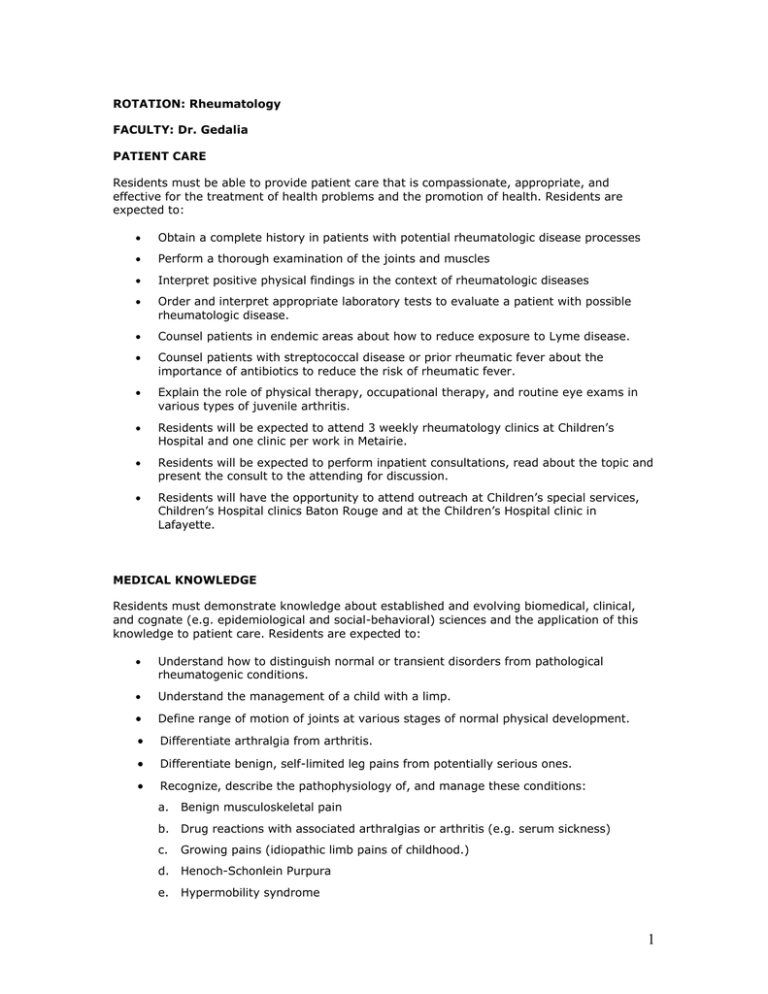ROTATION: Rheumatology FACULTY: Dr. Gedalia PATIENT CARE
advertisement

ROTATION: Rheumatology FACULTY: Dr. Gedalia PATIENT CARE Residents must be able to provide patient care that is compassionate, appropriate, and effective for the treatment of health problems and the promotion of health. Residents are expected to: Obtain a complete history in patients with potential rheumatologic disease processes Perform a thorough examination of the joints and muscles Interpret positive physical findings in the context of rheumatologic diseases Order and interpret appropriate laboratory tests to evaluate a patient with possible rheumatologic disease. Counsel patients in endemic areas about how to reduce exposure to Lyme disease. Counsel patients with streptococcal disease or prior rheumatic fever about the importance of antibiotics to reduce the risk of rheumatic fever. Explain the role of physical therapy, occupational therapy, and routine eye exams in various types of juvenile arthritis. Residents will be expected to attend 3 weekly rheumatology clinics at Children’s Hospital and one clinic per work in Metairie. Residents will be expected to perform inpatient consultations, read about the topic and present the consult to the attending for discussion. Residents will have the opportunity to attend outreach at Children’s special services, Children’s Hospital clinics Baton Rouge and at the Children’s Hospital clinic in Lafayette. MEDICAL KNOWLEDGE Residents must demonstrate knowledge about established and evolving biomedical, clinical, and cognate (e.g. epidemiological and social-behavioral) sciences and the application of this knowledge to patient care. Residents are expected to: Understand how to distinguish normal or transient disorders from pathological rheumatogenic conditions. Understand the management of a child with a limp. Define range of motion of joints at various stages of normal physical development. Differentiate arthralgia from arthritis. Differentiate benign, self-limited leg pains from potentially serious ones. Recognize, describe the pathophysiology of, and manage these conditions: a. Benign musculoskeletal pain b. Drug reactions with associated arthralgias or arthritis (e.g. serum sickness) c. Growing pains (idiopathic limb pains of childhood.) d. Henoch-Schonlein Purpura e. Hypermobility syndrome 1 f. Patellofemoral syndrome g. Transient synovitis h. Fibromyalgia syndrome i. Pain and somatization syndromes j. Reflex sympathetic dystrophy k. Orthopedic problems (legg-calv-perth’s disease, osgood-schlatter, slipped capital femoral epiphysis, chondromalacia petelae) Recognize, provide initial management of, and refer as needed the following: a. Acute rheumatic fever b. Juvenile rheumatoid arthritis c. Systemic lupus erythematosus d. Juvenile dermatomyositis e. Mixed connective tissue disease f. Kawasaki’s syndrome g. Scleroderma h. Spondyloarthropathies i. Arthritis associated with malignancy, inflammatory bowel disease, viral infections, bleeding diatheses j. Lyme disease k. Systemic vasculitides (polyarteritis nodosa, Takayasu arteritis) l. Childhood sarcoidosis m. Familial Mediterranean fever in children Discuss the evaluation, diagnostic work up, differential diagnosis, and initial management of the child with: a. Limp b. Swollen or painful joint c. Refusal to walk d. Refusal to use a limb PRACTICE-BASED LEARNING AND IMPROVEMENT Residents must be able to investigate and evaluate their patient care practices, appraise and assimilate scientific evidence, and improve their patient care practices. Residents are expected to: Residents will be expected to read selected articles and discuss them with the attending. Residents will be assessed at the end of the month by a multiple choice quiz. Residents will have the opportunity to participate in clinical or basic science research in rheumatology. 2 SYSTEMS-BASED PRACTICE Residents must demonstrate an awareness of and responsiveness to the larger context and system of health care and the ability to effectively call on system resources to provide care that is of optimal value. Residents are expected to: Understand the general pediatrician’s role in prevention and health maintenance of rheumatologic disorders. Understand how to diagnose and manage rheumatologic problems which generally do not require referral. Understand how to recognize, initiate management of, and refer rheumatologic problems which require referral. 3



